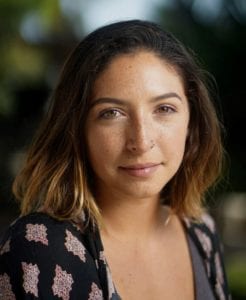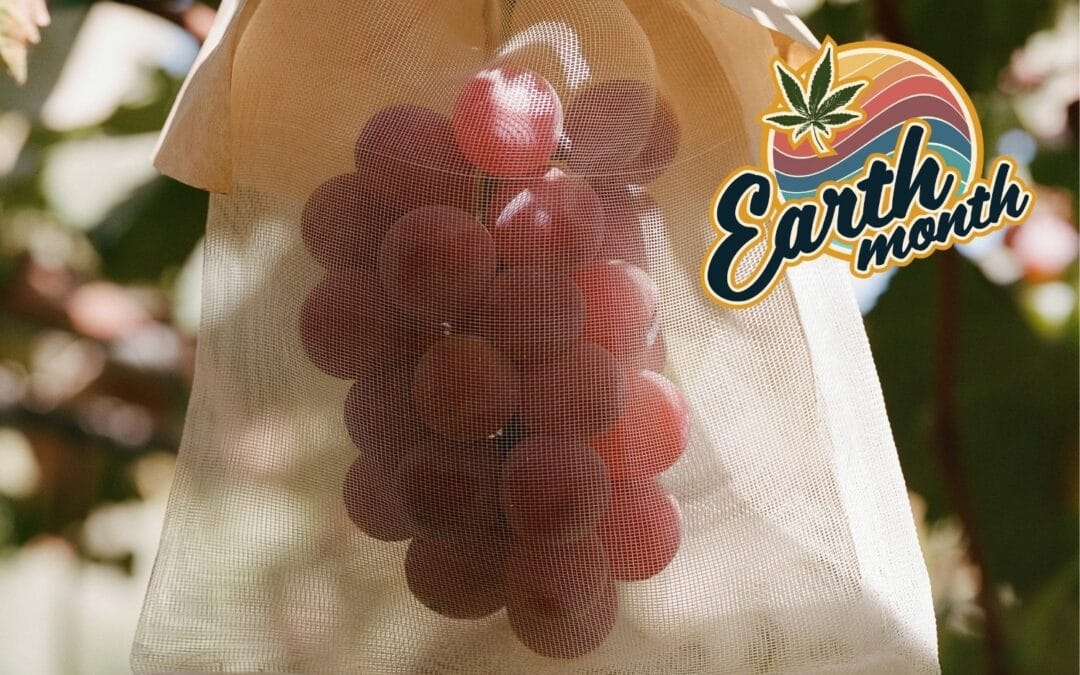I sat down virtually with Nathan Cozzolino, co-founder of Rose to talk about the brand’s vision for the future of the cannabis industry. Rose is California’s leading edibles brand developed by renowned chefs using regenerative agriculture. Infused with single-strain flower rosin, meticulously pressed in-house, Rose Delights are Turkish Delight-style infused edibles using rosin extracted from whole flower.
Brought to you as part of Torrey Holistics’s month-long celebration of earth month. Transcript has been edited for clarity and readability.
SHELBY: Hi guys! It’s me, Shelby, Torrey Holistics’ Lead Cannabis Educator, and I’m here today with Nathan Cozzolino of Rose Delights. He is one of the founding partners, and we’re really excited to have him here today. Welcome Nathan.
NATHAN: Thank you, thank you for having me.
SHELBY: Could you start by telling us a little about Rose and the brand’s mission and background?
NATHAN: Rose started off as a flower company. We focused mostly on flower. I have a 20 year history of flower procurement and distribution, and right around the dawn of recreational use in California 2017, we—like every other rec[reational] cannabis brand at the time—were hurrying to prepare packaging to sell flower. We began doing that and we felt like one of many, and we felt like there were a lot of companies out there doing a really good job of selling flower. In my opinion, it was mostly the brands who were also in charge of cultivating it who had a closed-loop company, and I wanted to step away and let the people who were cultivating their flower at that time be the ones responsible for creating brands and selling it. It felt more connected, more honest and genuine.
I wanted to put a little bit of thought into an edible because it was an opportunity at that time to develop something that wasn’t around in the space. An edible that spoke to people like myself and my friends as consumers. Something was missing. Edibles were seen as an opportunity to use by-product material from smokable flower, and very, very industrial food ingredients. We thought, we are in this Mecca of some of the best cannabis in the world and some of the best produce in the world. Shouldn’t that be an opportunity to unite these two things and create an edible that represented these ingredients and the culture behind them equally? The intersection of the culinary and agricultural world, both on the produce side and the cannabis side.
SHELBY: I love it. And Rose Delights, they’re kind of unique in the edible world, right—because of the flower rosin that you use to make those?
NATHAN: Yeah, we only ever use flower rosin. When you embark on an edible product, you need advice from people. Because cannabis edibles have been a cottage industry, home-kitchen type of thing back during pre-regulation—and when you’re embarking on how to package these things and sell them across the whole state—you need advice. And when you get advice from people, everybody advises you to start using distillate; that should be your starting point because distillate is scalable.
And that ties into the industrialization of cannabis in the United States. Recreational cannabis became a thing. It represented an opportunity for investors, which also represented an opportunity for all these business people in every area of the business—the people that manufacture the machinery that help with these processes, and obviously flower equipment and everything—every direction you turned it was a new opportunity to introduce a solution to someone in the business, and the solution to extracting flower was solvent-based extraction. This is how you make use of all that by-product, all that trim material. Throw it in a giant stainless steel vat, wash it with ethanol, butane, CO2, whatever, purge it, and that’s your extract.
Nothing about that process to us was attractive—not that there is no place for it. But we just didn’t think it represented the plant the best way it could. We thought there was an opportunity to let the plant do what it does—exist naturally and not interfere with nature and those chemical compounds. We wanted to take the way people made their edibles at home, using just heat and pressure extraction and figure out a way to incorporate that into our kitchen and make that our process for extracting.
So that was how we started with rosin extraction. But the feedback from everybody was like, this isn’t scalable. You’ll never be able to do this and provide it to any, you know, real population of people. This is only ever going to be this farmers-market, niche thing. Which didn’t sound so bad to us; that seemed attractive, too. But we did want to get something of this quality into as many hands as possible to bring flower used in an edible to people in its most powerful and effective form.
SHELBY: That’s very interesting. Definitely something that’s needed in the edibles category but in the cannabis industry as well.
So what is your background, and how did it inspire you to start Rose?
NATHAN: That’s a good question. In 2001 I took a summer job on a cannabis farm in Laytonville, California, and aside from being a teenager playing with cannabis, I think that was the first real behind-the-scenes look at cannabis that I got. From that point on, I was always in-and-out of the cannabis world. I had many friends with beautiful farms around California. I was mostly working as a creative in my twenties, but I would always get pulled back to cannabis, whether or not I’d be helping friends on farms or trimming for a summer. I had a lot of exposure to it.
Then in my late twenties, I was diagnosed with stage three cancer. At that point, I had been performing and acting a lot and I wasn’t going to be able to do that. So I started cultivating a small hobby grow to make ends meet, and also to grow and cultivate what I would use as medicine to help with a lot of the symptoms that came with the chemo and the drugs that they prescribed to manage the side effects and symptoms.
So I think my life from my twenties until now—I’m 40 years old—for the last 20 years has been creative work and cannabis work. When I talk about the industrialization of cannabis, and when recreational cannabis happened in California, I felt like a lot of the creativity, culture, and soul was stripped out of cannabis. There was an influx of institutional capital that was given to all these founders who had been working in cannabis in California—they knew what they were doing, but things grew too quickly and without any care or real thought given. It just wasn’t organic. And a lot of what was so beautiful and inspiring about the world of cannabis in California disappeared and everything just felt more industrial and a little bit dead. It didn’t feel alive and still evolving.
So when myself and my partners launched Rose, that was our opportunity to invest in the culture of cannabis in California—on the creative and on the culinary side. And I think that that’s how we wanted to use the opportunity. We built a brand around a mission and not economic objectives, and I think it gave us an opportunity to do something meaningful to us and ultimately that our audience—the Rose Delights consumer—would have an opportunity to connect to.
SHELBY: Speaking about what you’re saying about the industrialization of the cannabis industry and how it’s grown really quickly, Torrey Holistics is celebrating Earth Month all of April. So how in particular does sustainability fit in with Rose and the company’s ethos? Particularly in how you source your flower and your ingredients and the effects that it produces.
NATHAN: All the individuals who make up Rose—myself, our creative—we’re all haunted by the reality that we find ourselves in with the natural world and the way things are shaping up—how we are depleting our resources. Creating a consumer packaged good is a huge impact on resources. There’s a big footprint attached. You go into a store and you buy an eighth of flower and you get packaging on top of packaging on top of packaging. It’s like Russian Doll system of packaging. And you’re like, wow, this was a flower that came from the ground—the packaging should be designed so it can disappear into the ground. So I think as operators and as the creators of this product, we feel a huge responsibility to do things as considerately as we possibly can.
Part of what attracted us to cannabis and always kept us coming back is its existence in the natural world, and the beautiful places in which it thrives. It’s crazy to think that in order to create and scale a cannabis product, that you do so at risk of wiping out the natural resources—the core thing that cannabis depends on to sustain.

Rose Delights are made from locally-sourced, regeneratively-grown ingredients
All of that is to say we have this big weight on us to do things as thoughtfully as we can and in consideration of nature at every step of our process. And that starts with building up a network of farmers whose values align with ours—regenerative farms who have practices that are designed not for profits tomorrow, but for the generations to come. All of our products, everything that we’re cooking with utilizes ingredients that the purchase of supports this ecosystem. And Rose has a farm. The whole effort behind what we’re doing is to create this closed-loop edible.
So, aside from depending heavily on these regenerative produce and cannabis farms, we’re investing in farming ourselves, and we try to take responsibility for all of our inputs and outputs. If we purchase fruit from Dirty Girl produce, and there’s a bunch of watermelon rinds leftover, we compost those in our facility in our kitchen in San Francisco to turn them into compost that can be used to amend our soils, that can be used to grow our cannabis, that ultimately will be used to infuse our edibles. Looking at the whole picture, what we depend on to create the products that we do and how we can take responsibility for the production and waste of those products.
SHELBY: Nowadays, a lot of the times when we talk about sustainability, we talk about the health of the environment and also the health of the people. It sounds like Rose is really working to support these small farmers, but I’m interested also in how this plays into the company’s ethos? In particular, I know that your seasonal flavors are curated by renowned chefs as well—I would be curious to know if you have any insights coming from their side as well.

3 times Michelin Star Chef Dominique Crenn
NATHAN: I mean, Dominique Crenn, who was the chef we worked with this year—we met during her fight with cancer. That was the start to our conversations with her. She and I were treated at the same hospital—there’s some overlap there. We just connected, and we look at things similarly. She has a farm in Sonoma County where she cultivates a lot of the produce that they’re using on their menu at Atelier Crenn. I think it’s chefs and entrepreneurs like that who gave us a recipe to do what we do. It wouldn’t be without the Nomas and the Atelier Crenns and the Pujols of the world. Without them, we wouldn’t have the recipe to do what we’re doing. So, we’re not inventing this—we’re following other people who have created good examples and trying to innovate along the way, and do more than just copy what we’ve seen and been influenced by but hopefully add to that in some way.
SHELBY: Yeah, and of course there’s the health of the consumer as well. I’m sure that having all of these regeneratively-sourced, organic ingredients really plays a part, and has a synergy with the cannabis plant in terms of promoting peoples’ health and well-being.
NATHAN: I do think there’s an interplay. Ingredients don’t work in an isolated fashion; they work in combination with each other. So if you look at the cannabis with the other fruit and ingredients that are in there, something is going on between them in the way that they interact with our bodies. I can’t quantify or put it into any clever scientific terms, but I do think there’s a way that we benefit from combining the cannabis with real food ingredients that you would find in a lot of these farm-to-table restaurants.
When we talk about cannabis and health and edibles, I mean, we’re making desserts. Rose is making desserts—happiness is health. These are designed for pleasure. I think that these are the ways in which Rose contributes to the health of your customers, but beyond that I don’t look at this as a supplement. I don’t look at this as a health food. Case-by-case and person-by-person, I think it depends on what that person needs—if that person needs laughter, sleep, appetite, stress management, a quick mood shift—whatever it is. There’s a variety of ways that these things can contribute towards health. But really, we’re designing these for pleasure and flavor and comfort. So, those things play into the individual’s health is how I think that we’re looking at it.
SHELBY: Those are important things as well. So, what sorts of challenges have you faced in the cannabis industry and with Rose in particular?
NATHAN: As it relates to or pertaining to what?
SHELBY: I guess just generally or in terms of sustainability. You mentioned at the beginning of our interview that you faced some—I don’t know if I’d say criticism, but just some questions about bringing a product like Rose to scale. So I’m wondering if you’ve found that to be true.
NATHAN: If you look at Rose as a business and what we’re trying to do, there may be other examples but I don’t have any that come to mind that we’re copying. I think the criticism we’ve gotten often from the business minds in the space are like, but is it scalable? And you know, yeah—you want to use tomatoes and watermelons from Dirty Girl produce, but how many of those can they create? How are you going to sell these to the whole world? Recently in a conversation like that I got a little bit sassy and I was like, listen—if regenerative agriculture isn’t scalable, then neither is humankind, so we can just stop here.
I think it’s our responsibility to start looking at this as a new standard. I don’t think that ordering ingredients over Amazon and cracking cans and opening giant plastic bottles that have a huge footprint in the creation and to get to us, is scalable. Sure, you can use these ingredients to make a zillion of any product, but there’s a huge impact.

Sativa Pear Chile Rose Delights, curated by Chef Enrique Olvera
I think ultimately that’s it—people are trying to understand how you utilize regional produce. A huge piece of our core philosophy is fruit shouldn’t travel. We don’t want to use any fruit or any ingredient that’s traveled on a plane. We’ll make occasional exceptions—the chile Ancho that was in the Mezcal Poached Pear that came from Pujol restaurant. That’s a novelty. It’s a special treat. But we wouldn’t use a core ingredient, we wouldn’t be sourcing pears from somewhere where they had to fly in. We wanted to create a business that you can do for the West Coast and, once federalization happens and there’s no more borders in cannabis, this thing could be carbon copied in new territories. If we wanted to do this in the New York area, we’d rely on New York agriculture. We could do that if we wanted to move to Mexico or to France or wherever—we just recreate what we’ve done here in California, which is look around two to 400 miles around us to see what resources are available and depend solely on those to create products that are regionally-specific and for the people of that region. It’s not common, so people don’t know how to relate to it. They’re like, wait—you’re supposed to have one facility and just pump things out the whole world. And we’re like, well, it’s nice for people to be able to taste California produce in the form of Delights in Florida, or Michigan, or anywhere around the world; it’d also be nice for them to take produce from their backyard and for us to come up with the menu that’s specific to them. I think our dream is to operate and exist in that way.
SHELBY: Absolutely. One of my favorite books—it was actually written by the founder of Patagonia—is called Let My People Go Surfing, and they were talking also about how when they started out they tried to scale up and moved into too many areas too fast, and they realized that if everyone is always scaling up indefinitely, that in itself is not very sustainable. Maybe not speaking particularly to the environment, but from a business model as well. So it’s interesting that you say that.
NATHAN: Agreed.
SHELBY: So what would you say have been some of your biggest accomplishments?
NATHAN: They’re small things. Each recipe—it’s nice when they work. It’s nice to put an ingredient combination together. Oro Blanco Grapefruit, kiwi and celery—you’re like, why would anybody buy that? That sounds bizarre—like, how would that taste? And you put it together and you’re like wow, that has the most complex flavor profile of any edible I could have ever thought of or tasted. I think each time we take a chance with our chef or another chef we’re working with and it works out, it feels like a big accomplishment.
I think succeeding and being able to offer rosin-infused edibles statewide has been a big accomplishment. We went against the advice of everybody who was kind enough to lend us this advice and it ended up working out, and I think that was for the greater good of cannabis edibles customers. It gave people a flower rosin experience. What they would have made in their home kitchen, we emulated that sort of experience. I think that was our goal, what we ultimately wanted to do—you know, everything tastes the best when you make it yourself (when you don’t fail). So we wanted to create an experience that presented in a way where it’s like wow, there was a lot of care put into this. If I learn how to make a cannabis gummy in my own kitchen, I learn how to extract rosin from flower and puree and cook down fruits and put them all into one thing in my home kitchen, it would sort of taste and be an experience similar to this. I think that’s what we continually set out to achieve. Anytime we feel like that happens with any one of our recipes, we feel like we’re on-mission and continuing with what we set out to achieve.
SHELBY: So what is your vision of the future of the cannabis industry, and how do you see Rose playing a part in shaping it?
NATHAN: You know, this is like a big dream, but I hope that we’re creating a model that other people can replicate. I hope we set new standards. Not because we had a better idea of how to do anything, but I think so much of what we’re doing connects back to this mission and sustainability. Cannabis is so—it’s not our fault, it’s the regulators—it’s so irresponsible. The packaging is so inexcusable. It grew too fast and without thought and it needs to be changed. People need to put their heads together to figure out better solutions for ways of operating in the future. I’m hoping if we create a closed-loop edible and it catches on and enough people appreciate it and identify with that sort of model, I hope other brands are inspired or brands to come are inspired to do the same. And I really hope we can build our network of cannabis farmers who are using practices that connect to this ethos, and I hope we can build a really strong and robust network of the produce farmers that get an opportunity for regenerative agriculture to really thrive as it ties into the production of any sort of cannabis edible.
So I think that’s the future. Thats the future I hope for, and it’ll start with us. It’ll start with the conversion of a 10-acre property in Nevada County, and successfully connecting manufacturing to cultivation back to manufacturing. I hope our packaging gets more sustainable than it already is, and smarter over time—and I hope other peoples’ do too. Just a return to innocence and a restructuring of the industrialized cannabis product. I want it to return to something more simple and more about presenting real value to the customer, and less about selling an idea of a thing and taking money, but not really any honest exchange of value for real value.
SHELBY: I will say, you mentioned making Rose’s packaging more sustainable but even as it is, it comes in a beautiful little compact—I believe recyclable—box. So even there you’re starting off on a good foot.
NATHAN: Yeah, always work to be done. Our bags are exo-biodegradable—we would love for it to be simply compostable, like throw it in your dirt and let it let it do what it does. But these are more mid-term goals for us.
SHELBY: So wrapping up, if there is one thing you could express to consumers, what would it be? Particularly on the importance of shopping sustainably for cannabis.
NATHAN: I think marketing is a very deceptive thing, and there’s a lot of clever minds in marketing, so it’s always going to be hard to understand how to sniff out what fits into your life in a healthy way. Like, healthy consumer habits. I think my advice for the customer is to always step back and look at things realistically and ask questions and demand real answers of their brands and don’t always take things for face value. Do spend a little bit of extra time and do some research. I think it will improve the quality of everybody’s life to make better, more informed consumer choices. But really try to sniff out the companies whose values align with yours and the way you try to live your life and support those companies.
SHELBY: Great words of wisdom—for cannabis and in general. Thank you so much Nathan, it was a pleasure having you on today. Once again, I’m Shelby with Torrey Holistics and we’ll see you next time.
NATHAN: It’s been a pleasure talking.
These statements have not been evaluated by the FDA. Nothing said, done, typed, printed or reproduced by Torrey Holistics is intended to diagnose, prescribe, treat or take the place of a licensed physician.
About the Author


